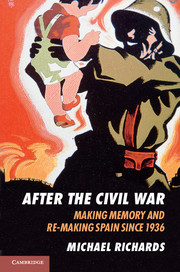Book contents
- Frontmatter
- Contents
- List of maps and tables
- Preface
- Acknowledgements
- Maps
- Introduction: cultural trauma in Spain
- Part I Setting the scene
- Part II Memories of war during the Franco years
- Part III Memories of war after Franco
- 10 Transition and consent: the presence of the past, 1975–1980
- 11 ‘The level of our times’: memory and modernisation, 1981–1996
- 12 Collective identity and the ethics of memory, 1996–2007
- Conclusion: the history of war memories in Spain
- Glossary and abbreviations
- Sources and select bibliography
- Index
- References
11 - ‘The level of our times’: memory and modernisation, 1981–1996
Published online by Cambridge University Press: 05 June 2013
- Frontmatter
- Contents
- List of maps and tables
- Preface
- Acknowledgements
- Maps
- Introduction: cultural trauma in Spain
- Part I Setting the scene
- Part II Memories of war during the Franco years
- Part III Memories of war after Franco
- 10 Transition and consent: the presence of the past, 1975–1980
- 11 ‘The level of our times’: memory and modernisation, 1981–1996
- 12 Collective identity and the ethics of memory, 1996–2007
- Conclusion: the history of war memories in Spain
- Glossary and abbreviations
- Sources and select bibliography
- Index
- References
Summary
The man who lives completely and pleasurably in accord with current ways is conscious of the relationship between the level of our time and that of various past times.
Consolidating democracy
In May 1982 the influential Catalan businessman and liberal politician José María Figueras summarised both the inherent progress and the dangers of the political situation as he viewed it: ‘there is a great difference between the Spain of today and that of yesterday: Spain today is moderate’. Figueras, a child of the war, born in 1928, who had founded the Centro de Estudios de Historia Contemporánea in Barcelona in the 1960s to encourage study of the civil war, supported a broad movement to disseminate information about the difficult past and its relationship to the present. The Centro, possessing a library which included many works donated by Republican exiles, was opened to the public only in 1976 and, in the same year, a pocket book entitled What Is Capitalism? had been published by him in the series Biblioteca de Divulgación Política. The country's ‘moderation’ at the start of the 1980s was ‘as novel a phenomenon as it is fundamental’, according to Figueras, and originated in both ‘the great lesson of the civil war’ and the economic development of the 1960s: ‘certainly a materialist phenomenon, but also a pacifying one’. Spain, he went on, was enjoying a ‘consensus within the body social and amongst its political parties’. Like others, he was also conscious of a continued threat, however: ‘we cannot yet be sure that this [democracy] is firmly consolidated; traditions, mental habits, genuine political forces, are lacking and there is economic crisis and will be again’.
- Type
- Chapter
- Information
- After the Civil WarMaking Memory and Re-Making Spain since 1936, pp. 304 - 329Publisher: Cambridge University PressPrint publication year: 2013

